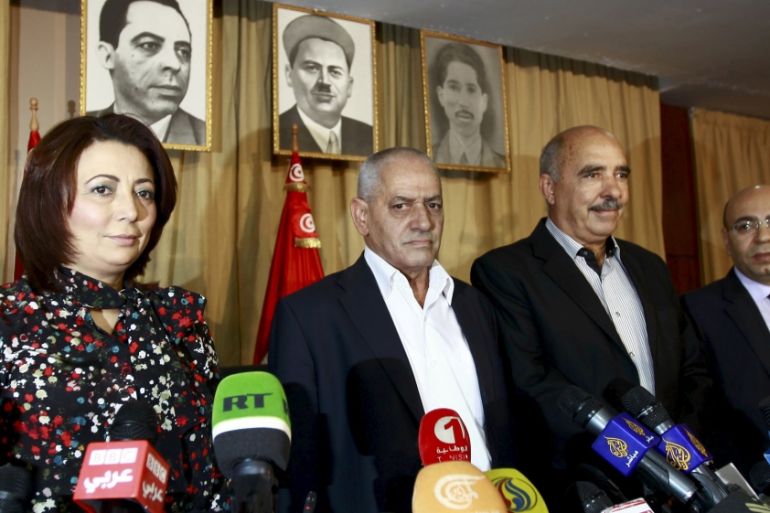Tunisia’s Nobel pride
Pro-democracy group of four organisations wins peace prize, prompting a revision of the country’s achievements.

Tunis – Two years is a long time in politics, especially in a country transitioning to democracy from authoritarian rule. After the news broke on Friday that this year’s Nobel Peace Prize has been awarded to the now-dissolved National Dialogue Quartet, some in Tunisia had difficulty recalling that four-member panel, or even the political crisis of the long, hot summer of 2013 that had prompted its creation.
The media was on hand to remind them. The Quartet had been made up of a businesswoman, a trade unionist, a human rights activist and a lawyer – each representing his or her respective national associations. It had brought Tunisia’s politicians to the table after the political parties on their own had failed to close a dangerously widening rift between the then-ruling Islamist party Ennahda and its opponents.
The Nobel committee said this year’s prize is intended to “be an inspiration to all those who seek to promote peace and democracy in the Middle East, North Africa and the rest of the world”.
RELATED: Nobel Peace Prize for Tunisian democracy group
For a young teacher boarding Tunis’ tramway, giving his name as Tareq, the message was clear: give peace a chance. “The positive thing about the Quartet was communication. We had no war here, unlike elsewhere in the Arab world,” he said.
On Radio Mosaique, callers to a phone-in discussion expressed their pride as Tunisians. The prize came as a welcome boost, they said, and might “encourage investment”.
A presenter on the privately-owned Tounissia TV channel commented: “We all know the country still has problems, with terrorism, with the economy and so on. But now is the time to celebrate!” She played out her studio discussion with the national anthem.
Divisive legacy
Tunisia’s political life is still buffeted by unexpected squalls, scandals and controversies. The question of how to tackle the legacy of corruption from the era of former President Zine al-Abidine Ben Ali is proving particularly divisive. Meanwhile, much airtime on Friday was devoted to the news that gunmen had targeted businessman Ridha Charfeddine, a member of parliament for the Nidaa Tounes party, for reasons as yet unknown.
The committee in Oslo was too diplomatic to mention it, but the backdrop to Tunisia’s 2013 crisis had been the situation in Egypt. The army had removed the elected president, Mohamed Morsi, from office in July. Ordinary Egyptians rallied in huge numbers in support of the army’s move.

Some Tunisian political players wondered whether their own country’s Islamist-led government might be bounced out of office through people power in the streets.
Two political killings – of leftist politician Chokri Belaid in February 2013 and an Arab nationalist MP Mohamed Brahmi in July – had already shaken public confidence in the political process. The opposition bitterly accused the Nahda-led coalition government of having tolerated Islamist radicals believed to be behind the two killings. They appealed to the public to join nightly protests calling for the dissolution of the constituent assembly, elected after the 2011 revolution with Ennahda as its largest bloc. Playing a numbers game, Ennahda responded with competing rallies.
When pictures of the mass killings of Morsi supporters in Cairo’s Rabaa al-Adawiya Square hit Tunisian newstands in mid-August, even those adamantly opposed to Ennahda were given pause.
Back from the brink
As has happened before and since, figures inside and outside Tunisia’s political world came together to pull the country back from the brink. The National Dialogue Quartet was unveiled. After some false starts, inter-party talks began under its supervision.
For grocer Khalid Djerbi, near the capital’s central market on Friday, the issues had been starkly clear: “There were people we had elected, and others wanted to get rid of them! But we came through it all in the end.”
The Quartet’s efforts eventually secured cross-party agreement for the Islamist-led government to leave office voluntarily – but only after a new, democratic constitution had been finalised by the assembly in January 2014.
Observers agree that the most obdurate mediator in the Quartet was probably Hocine Abassi, representing the Tunisian General Labour Union (UGTT). With years of experience in negotiations, he also prevailed over senior UGTT comrades who opposed compromise with the Islamists.
His opposite number in the Quartet was Wided Bouchamoui, chair of Tunisian Employers’ Association (UTICA). Representatives of the Tunisian Human Rights League and of the Tunisian Order of Lawyers completed the panel.
Lotfi Zeitoun, a member of Nahda’s executive bureau, believes that a meeting in Paris between Rached Ghannouchi, Ennahda party leader, and Beji Caid Sebsi, founder of the Nidaa Tounes party (and now Tunisian president), in August 2013 prepared the ground for the Quartet: “The two agreed to call off all their respective demonstrations,” and to stop escalating things via the media, he said.
Perhaps one unsung hero of the story is the broad Tunisian public. By staying at home that summer, and not turning out on the streets in the numbers some politicians hoped for, they made it clear that any Egyptian-style solution was not for them.
Follow Eileen Byrne on Twitter: @ EileenBByrne